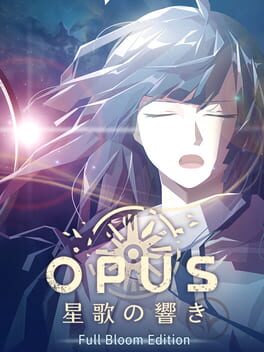This game's focus is primarily its story, which is a very good and rewarding one. With that said, though, the gameplay can be a bit repetitive, yes, but the small struggles and micromanagement the player faces across the journey build up to a more intimate and maybe even more grounded relationship between the characters. The story can get a little too monotonous or dragged out at times, too, especially considering the characters' ultimate motivations, which are kinda static and similar to the others' ones. This, however, also serves a reason, and that reason, neatly executed as it is, almost totally overshadows these nitpicks.
That reason is the fact that Opus' story is, above all else, about the characters finding their purpose amidst a place as vast as a galaxy. The tale being told here is not one of a large scale and stakes, like the ones usually found in epic sci-fi operas. Rather, it's about a handful of people. About how they deal with loss, acceptance, and growing up. And it's about, in the end, how all of that feeds into and is guided by their inner-voice, their starsong. Because of this, some relationships take quite a while to develop, and while, for sure, that can harm the overall experience, it's also just a by-factor of how hesitant these characters are of diving deeper into this world so crowded with multiple "starsongs" noise (other people's lives), indifference and uncertainty. Being so, Jun's early efforts regarding his "clan's honor" and Eda's unwavering earnestness to find this "Banshee" thing are just ways for them to find certainty despite all of that.
With all of that, the small steps toward acceptance and the eventual conclusion shine even brighter, because, like with the gameplay stuff I mentioned, the friction adds intimacy and weight to the plot. Nearing the game's end, I started noticing more and more the real importance of lumen. This bright omnipresent thing is not just a sci-fi worlds' ore or something, but also a metaphor to the light one must follow, not by using their eyes or body, but by listening to their inner-voice, so that they can find, or at least try to, their purpose. This fits well with the overarching religious/spiritual thematic, but transcends that, the same way that people's will can transcend its time and space, the context it's set in, if it has to in order to be fulfilled. Through a religious afterlife lens, that comes in the form of a paradise. Through a more grounded one, that is visible in the lingering impact your have on others' lives and memories during and after you die. Or maybe you don't need to transcend shit, and are satisfied just by knowing you tried, even if for a tiny fraction of your life, to listen to your starsong.
Space and time weren't able to separate Jun and even Remi from Eda. There were the memories. There were the emotions, dissolved across the lumen. There were the flowers, in an everlasting full bloom. It wasn't too late for Eda to truly understand what it meant to be herself, nor did Jun wait for 60+ years in vain. Because, for even a tiny moment, there was the field of flowers. In finding each other again, they found themselves.
That reason is the fact that Opus' story is, above all else, about the characters finding their purpose amidst a place as vast as a galaxy. The tale being told here is not one of a large scale and stakes, like the ones usually found in epic sci-fi operas. Rather, it's about a handful of people. About how they deal with loss, acceptance, and growing up. And it's about, in the end, how all of that feeds into and is guided by their inner-voice, their starsong. Because of this, some relationships take quite a while to develop, and while, for sure, that can harm the overall experience, it's also just a by-factor of how hesitant these characters are of diving deeper into this world so crowded with multiple "starsongs" noise (other people's lives), indifference and uncertainty. Being so, Jun's early efforts regarding his "clan's honor" and Eda's unwavering earnestness to find this "Banshee" thing are just ways for them to find certainty despite all of that.
With all of that, the small steps toward acceptance and the eventual conclusion shine even brighter, because, like with the gameplay stuff I mentioned, the friction adds intimacy and weight to the plot. Nearing the game's end, I started noticing more and more the real importance of lumen. This bright omnipresent thing is not just a sci-fi worlds' ore or something, but also a metaphor to the light one must follow, not by using their eyes or body, but by listening to their inner-voice, so that they can find, or at least try to, their purpose. This fits well with the overarching religious/spiritual thematic, but transcends that, the same way that people's will can transcend its time and space, the context it's set in, if it has to in order to be fulfilled. Through a religious afterlife lens, that comes in the form of a paradise. Through a more grounded one, that is visible in the lingering impact your have on others' lives and memories during and after you die. Or maybe you don't need to transcend shit, and are satisfied just by knowing you tried, even if for a tiny fraction of your life, to listen to your starsong.
Space and time weren't able to separate Jun and even Remi from Eda. There were the memories. There were the emotions, dissolved across the lumen. There were the flowers, in an everlasting full bloom. It wasn't too late for Eda to truly understand what it meant to be herself, nor did Jun wait for 60+ years in vain. Because, for even a tiny moment, there was the field of flowers. In finding each other again, they found themselves.
